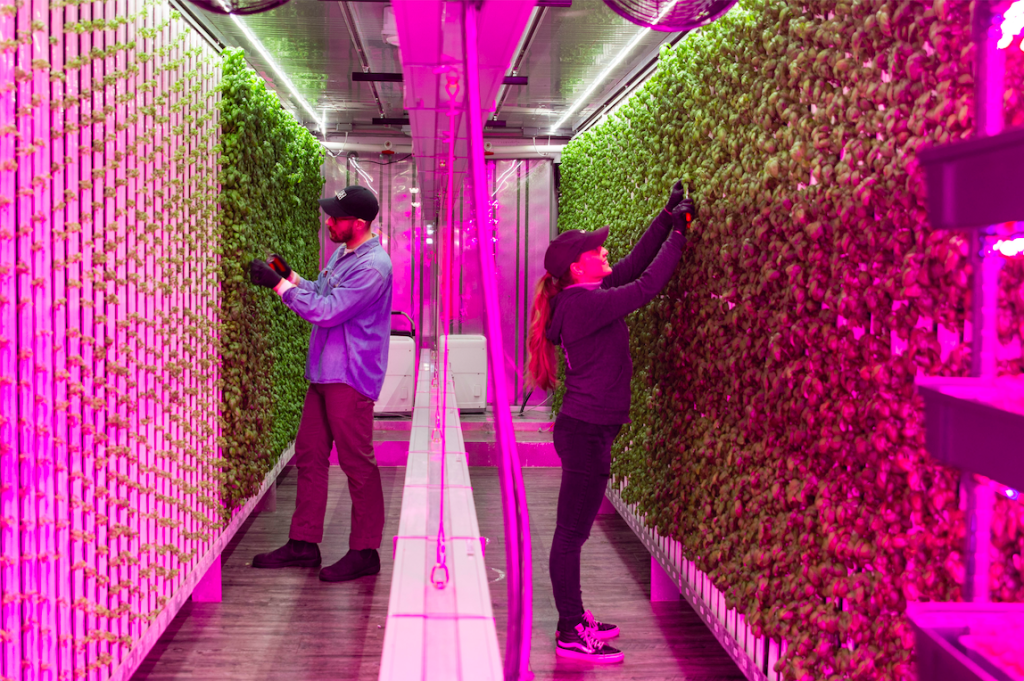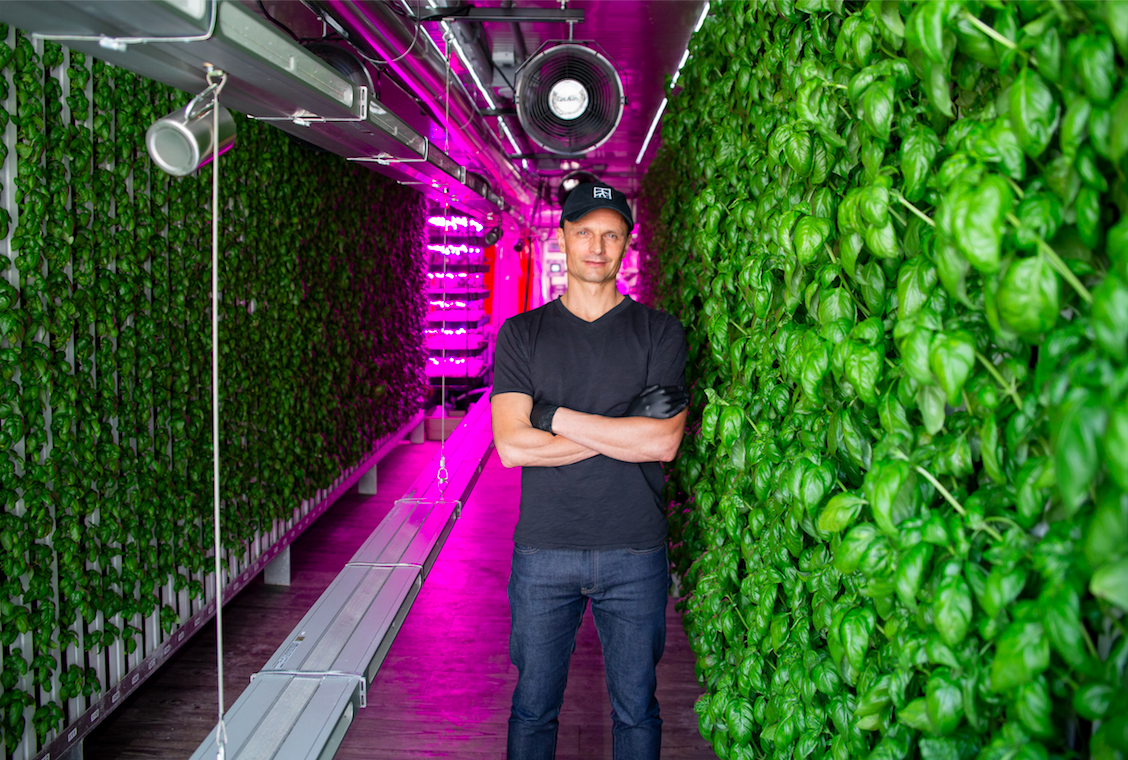By Wes Melville
Tobias Peggs is the CEO of Square Roots, an urban farming company based in Brooklyn, NY with a mission to bring local, real food to people in cities around the world by empowering next-gen leaders in urban farming. Their scalable “farmer-first” technology platform grows hyper-local, fresh food— year-round in climate-controlled, state-of-the-art modular containers —while simultaneously training future generations of farmers.
Below is our interview with Tobias Peggs.
How did your own entrepreneurial journey lead to Square Roots? What compelled you to tackle the issue of food?
I joke that I went to university (in my native UK) without an email address – because essentially, they didn’t exist for normal people – and the day I left (with a PhD in AI) I started a web company. That was all in the mid-90s. So, I’ve been in tech for a while now.
When I moved to the US, I met Kimbal Musk and joined him at a new social media analytics tech company called OneRiot. After a skiing accident, Kimbal decided to focus full-time on his restaurant company, The Kitchen, and his personal mission of bringing real food to everyone. That’s when I became CEO of OneRiot, which was acquired by Walmart in 2011, and I ended up running mobile commerce for international markets. I got curious about food systems there – working with huge data sets of the groceries people were buying across the globe and researching where those foods were being grown. I began to visualize food being shipped across the world before consumers bought it. It’s well known that the average apple you buy in a US supermarket has been traveling for 9 months and is coated in wax to stop it from decomposing. Meanwhile, the average tomato today travels 1,800 miles to get from farm to table. That is industrial food.
Later, I became CEO of an NYC photo editing app called Aviary but couldn’t get this map of the industrial food system out of my head. When Aviary was acquired by Adobe, I re-joined Kimbal at The Kitchen and we started developing the idea for Square Roots.
What we saw was that millions of people, especially those in our biggest cities, were at the mercy of industrial food. This is high calorie, low nutrient food that’s shipped in from thousands of miles away. It leaves people disconnected from their food and the people who grow it. At the same time, we also saw people were losing trust in their current food system and wanted what we call “real food.” Essentially, this is local food where you know your farmer.
The industrial food system is not going to solve this problem. Instead, we felt this presented an extraordinary opportunity for a new generation of leaders—those who understand urban agriculture, community, and the power of real, local food. So, we set up Square Roots as a platform to empower the next generation of farmers to become leaders in this real food revolution.

Why is indoor agriculture such an important issue?
By 2050 we will have a population of about 10 billion people, 70% of which will live in urban areas. The current industrial food system is not a sustainable way to feed that future world. We need new solutions that are better for people, the planet, and are sustainable for business.
Indoor farming can be part of the solution by:
– Providing fresh, local food to any location year-round.
– Using fewer resources. For example, Square Roots farms use 90% less water than outdoor farms. We’re able to substantially cut down on waste associated with traditional agriculture because we’re located within a few miles of the end consumer, there’s basically no spoilage, and we can precision grow our herbs to be the same size as our packaging so there’s less trimming.
– Getting urban consumers connected to the local farm and farmer and rebuilding communities around food.
What actions can people take to help accelerate this impact?
There are lots of ways to get involved—it can be as simple as looking for “locally grown” labels when you shop and buying them. People can get involved at Square Roots by attending one of our monthly farm tours or by applying to become a next-gen farmer!
Square Roots builds urban farming facilities in climate-controlled shipping containers. What is the underlying technology for your containers? How much is each able to produce?
Our technology is based on our ‘farmer-first’ platform that surrounds our farmers with data, insights, and tools, so they can grow non-GMO, pesticide-free, delicious food, all year round.
Throughout our farms are a series of climate sensors that capture thousands of data points per day. Because we grow in a completely closed environment, we have full control over each climate parameter—from CO2 in the air, to the number of hours of light. We research the best natural climate for a certain variety of plant, recreate it inside the farm, and grow the best tasting produce, 365 days a year.
The farms can maintain a perfect climate for the plants on its own, but it has also been designed to work in harmony with our farmers. Our proprietary software provides farmers with things like expert assistance and crop scheduling, making the daily workflow in the farms as easy as possible.
Our new Michigan campus, opening in September 2019, will produce over 50,000 lbs of premium product each year to start, and can expand from there to meet local market demand.
You also operate a Next-Gen Farmer Training Program that trains participants on the nuances of indoor urban farming and positions them as future leaders of the indoor urban ag industry. How long is the program and what are the farmers learning? What roles are they filling upon graduation?
Our Next-Gen Farmer Training Program is a year-long program that puts farmers at the forefront of the indoor urban agriculture industry. No previous farming experience is necessary to apply — just the passion and entrepreneurial spirit to jump in and start learning. Our next-gen farmers are full-time employees of the Square Roots team. Similar to traditional farmer apprenticeships, farm skills are learned through both curriculum and hands-on training.
Throughout the year, additional programmed lectures, workshops, and more cover a wide range of topics—from integrated pest management practices to real food entrepreneurship frameworks. Our mission is to empower the next generation of leaders, so this is a diverse and full program that touches many aspects of the indoor farming industry and beyond.
Square Roots program alumni have gone on to start their own urban farming businesses, take incredible jobs at other forward-thinking companies in urban ag, and moved into permanent positions on the Square Roots team. Our Next-Gen Farmer Training program provides unique experience and insight into the many roles for leaders in the future of food.
What is Square Roots’ business model? When do you expect to be profitable?
It’s a simple business—we grow food and sell it. Since we’re an indoor, controlled-climate farm, we can grow a lot of very high-quality food consistently, all year round, and we sell it through retail stores across the city and online. While our individual farms could be profitable today, we’re choosing instead to invest heavily in our Next-Gen Farmer Training Program and building out a very scalable technology platform that will support a much bigger company in the future.
You recently announced a major partnership with Gordon Food Service, one of the country’s largest food distributors. What does this partnership mean for Square Roots and how will it scale your impact? What will be the eventual impact for consumers?
In March 2019, we announced our partnership with Gordon Food Service that will allow us to bring local, real food to more people across North America. Through this partnership, we will see new campuses of Square Roots’ indoor farms built on or near Gordon Food Service distribution centers and retail stores across the continent—the first of which will open in Grand Rapids, Michigan this fall 2019. Not only will we be able to bring fresh, hyper-local food to people living in Michigan and the surrounding areas, but we will also have the opportunity to train more future farmers through our unique Next-Gen Farmer Training Program.
What do you think is going to be the next big innovation in urban farming?
There’s a lot of investment and innovation going into robotics and automation for indoor farming—but consumers don’t necessarily care about that. What they care about is consistent availability of delicious food that they can trust. I’m excited about innovations to get more food types to market using these systems—strawberries are next for us. And, I’m excited about ways we can inspire more young people to get into the industry, become high tech farmers and the next generation of leaders—because the more of us working the real food revolution, the better.

